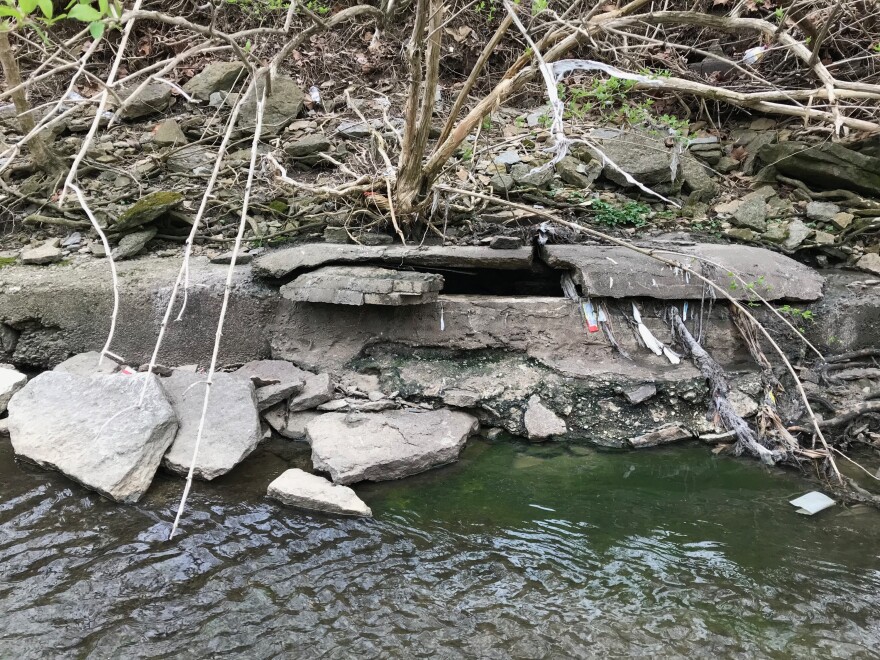After years of arguments that intensified in the last few months, Hamilton County and Cincinnati officials may have a tentative agreement to replace a failing sewer line in Green Township.
The Metropolitan Sewer District's (MSD) Upper Muddy Creek interceptor is old and located in the creek. The pipe has several breaches, and that allows untreated wastewater to flow into Muddy Creek on dry days. The problem becomes even worse during heavy rain events. MSD has said this allows 313 million gallons of untreated sewage to flow into the creek annually. People have even shared pictures on social media of toilet paper hanging in nearby trees.
The county commission could approve a plan for the replacement project Thursday.
"This is a compromise document," said County Commission President Denise Driehaus. "There is just a little bit of tension. However, I am anxious to move forward."
Cincinnati Council Member Greg Landsman has been pushing the project for months. He said it's a win for the environment and those who live along Muddy Creek especially children.
"We have to get that degraded sewer pipe out of the creek and replace it. Now MSD can do just that," Landsman said. "I'm grateful that everyone kept working through this, and with our residents, and that we finally have an agreement to get this done."
The city and county had been arguing about whether the pipe needs to be replaced or could instead be repaired; the size of the replacement pipe; and whether fixing the upper portion of the interceptor will cause overflow and flooding issues downstream in Muddy Creek and in Sayler Park.
The last part of downstream overflows was the final hurdle to be cleared in recent weeks.
City modeling from 2018 suggested there could be some overflows at four manholes during a wet weather event. But now the city has updated modeling that shows those overflows can be eliminated. MSD said that is possible because of other improvements in the sewer system including diverting flows to other parts of the system that can handle it in wet weather.
The county's MSD monitoring team, and hired outside consultants, had been questioning how that was possible.
The county is accepting MSD's modeling. But Assistant County Administrator Holly Christmann said the resolution approving the project will have some "protection and comfort" built in.
"It does rely on our operators (the city) assurances, it does rely on their professional judgement, and their modeling which we have historically had concerns with," Christmann said. "However, we do put in there as I had mentioned the requirement that MSD have a contingency plan if things change with the modeling or during the construction of the project."
The project to fix the Upper Muddy Creek interceptor was a required project under a federal consent decree to stop untreated wastewater from flowing into local streams. The work was supposed to have been completed by Dec. 31, 2019. It hasn't happened yet, but the city and county could face fines for missing that deadline.
The Muddy Creek issue is one of many contentious issues involving MSD. The county owns the sewer district, and the commissioner set the budget for the agency. The city operates the utility and claims ownership of the assets that is brought to the district when it was established in 1968.
That 50-year agreement expired in 2018, but a federal judge has ordered it remain in place until a replacement arrangement is agreed to. But so far that has not happened, and both sides have continued arguing.
Last month, Federal Judge Michael Barrett slapped both the county and the city on the hand for the ongoing feud about MSD, and who's in charge and who makes the decisions.
"If the parties are not able to stop the finger pointing and begin to work collaboratively, the court will be forced to implement more draconian measures consistent with this court's power to enforce the consent decree," Barrett wrote in his opinion and order.
Many Phase One consent decree projects were completed in 2018 and 2019, but more work is needed to reduce sewer overflows during heavy rain events.
The two sides have not been able to agree on what projects should be included in the second phase of the plan, or how long that part of the plan to should last.



